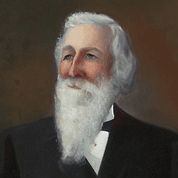Chronology
1830
Josiah Abigail Patterson (J.A.P.), Campbell Sr. born March 2 to Presbyterian minister Rev Robert Bond Campbell and his wife Mary Ada (Patterson) Campbell, in Lancaster District, South Carolina1Citation: Autobiography of Judge J.A.P. Campbell: Written for his Descendants on the 84th Anniversary of His Birth, March 2 A.D. 1914, Daily Clarion Ledger, Jackson, Mississippi, October 22, 1914..
1843
Began Davidson College, age 13, as a member of the Class of 1847. Left before graduating2Citation: Death announcement of Judge J.A.P. Campbell, Jackson (Mississippi) Daily News, January 11, 1917..
1845
Moved with his family to Madison County Mississippi3Citation: Campbell Autobiography, op. cit..
1847
Licensed to practice law June 12, 1847, at age 174Citation: Campbell Autobiography, op. cit..
1848
In March, settled as a private practice lawyer in Kosciusko Mississippi5Citation: Campbell Autobiography, op. cit..
1850
Married Eugenia Elizabeth Nash, daughter of First Baptist Church of Kosciusko minister William Whitfield Nash and his wife Nancy (Dodson) Nash6Citation: Campbell Autobiography, op. cit..
1851
Elected to the Mississippi legislature representing Attala County at age 217Citation: Campbell Autobiography, op. cit..
1859
Became speaker of the Mississippi House of Representatives at age 298Citation: Campbell Autobiography, op. cit..
1860
Elected, at age 30, to be one of seven Mississippi representatives of the Confederate Constitutional Convention, which adopted articles of secession from the United States9Citation: Campbell Autobiography, op. cit..
1862
Enlisted May 3, 1862, as Captain of the Campbell Guard of Attala County, Mississippi, which later became Company K of the 40th Mississippi Regiment10Citation: Campbell Autobiography, op. cit..
Appointed May 14, 1862, as Lt Colonel of the 40th Mississippi Regiment.
Wounded October 5, 1862, at the Battle of Corinth but later rejoined the company at Grenada11Citation: “W.D. Holder Chapter, United Daughters of Confederacy, Memorialize Judge Campbell,” Daily Clarion-Ledger, Jackson, Mississippi, March 6, 1932, p 5..
Appointed December 16, 1862, as Colonel of the Confederate Army Cavalry, and assigned to duty as a member of the Military Court of Lt General Polk’s Army Corps.
1863
Released from regimental duty January 8, 1863, appointed a member of the Military Court, and ordered to return to Kosciusko Mississippi.
1864
Appointed July 29, 1864, by the CSA Army Secretary of War, to be presiding judge of the Military Court of Lt General Hardee’s Corps.
1865
Permitted to return to his home on May 2, 1865, after stating his “solemn obligation not to take up arms against the Government of the United States.”
1867
Elected December 15, 1866, as circuit judge of the 5th judicial district of Mississippi (Attala, Leake, Madison, Yazoo and Holmes)12Citation: Campbell Autobiography, op. cit..
Began his duties on the first Monday of January 1867.
1870
Elected Professor of Law in the University of Mississippi, but declined. The University nevertheless conferred him the honorary title of LL.D13Citation: Campbell Autobiography, op. cit..
Appointed by the Governor as one of three commissioners to codify the statutes of Mississippi14Citation: Campbell Autobiography, op. cit.15Citation: Memorialize Judge Campbell, op. cit..
1875
Appointed by James Zachariah George as “one of the committee which managed the glorious campaign in 1875.16Citation: Campbell Autobiography, op. cit.17Citation: Campbell refers to General James Zachariah George, the chairman of the Mississippi “Democratic State committee that faced the task of overthrowing the Ames administration and establishing white supremacy in the State. General George was put in charge of the campaign as State chairman, to which he gave his whole time and thought. When the Clinton riot and its attendant reprisals seemed to destroy hope of success, he met Governor Ames in conference and handled the situation with frankness, calmness and great strength of character. Quiet was restored and the campaign proceeded, with as much freedom from violence as could have been expected, to the election of a white majority in the legislature.” Courts, Judges, and Lawyers of Mississippi, 1798-1935, Dunbar Rowland, B.S., LL.B., LL.D., Press of Hederman Press, Jackson, Mississippi, 1935, pp 99-103.”
1876
Appointed at age 46 on April 14, 1876, by Governor J.M. Stone, as Supreme Judge of the 3rd District of the Supreme Court of Mississippi. Spent most of that time as Chief Justice18Citation: Campbell Autobiography, op. cit.19Citation: Speech Delivered by Judge J.A. Teat, at Louisville, July 13th, 1914, Opening his Campaign for Circuit Judge, Mississippi Searchlight, July 13, 1914, pp 5-7.
1878
Prepared a new code of statutes for the state of Mississippi. (It was adopted in 1880, and as of 2022, still largely serves as the foundation for the state’s current laws20Citation: Campbell Autobiography, op. cit..)
1880
New code adopted.
1884
Reappointed February 25, 1884, by Governor Robert Lowry, as Judge of the Mississippi Supreme Court of the 3rd District. Spent most of that time as Chief Justice21Citation: Speech Delivered by Judge J.A. Teat, op. cit..
1894
Retired as Chief Justice from the Mississippi Supreme Court at age 6422Citation: Campbell Autobiography, op. cit.23Citation: Memorialize Judge Campbell, op. cit..
1902
Invited on November 19, 1902, by the Mississippi Department of Archives and History to submit an oil painting of himself. As of 2022, the painting, based on this photograph, hangs in the Mississippi Archives building in Jackson Mississippi.
1909
Called by C.H. Alexander, Esq., the former chairman of a committee of the State Bar association, as the “author of more legal reforms than any other lawyer, judge or legislator in the state24Citation: Campbell Autobiography, op. cit..”
1917
Died January 10, 1917, at age 86, as the last living signer of the Confederate Constitution. Memorialized as ranking among “the most illustrious sons of Mississippi” and “recognized as the foremost legal authority in the state.” Body laid in state on January 12, 191725Citation: Memorialize Judge Campbell, op. cit..












